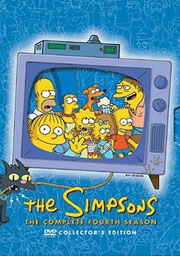 With the temperature dropping, it's time to find someone to keep you warm. Find your hookups with our online dating guide!
With the temperature dropping, it's time to find someone to keep you warm. Find your hookups with our online dating guide!
Nancy Cartwright, Yeardley Smith,
Hank Azaria, Harry Shearer
- Comedy
- 1992
- Buy the DVD
Reviewed by David Medsker
()
ans of “The Simpsons” were hooked from day one, but time has rendered some of their earlier episodes less amusing or edgy than they seemed at the time. (Bart decapitating the statue of Jeremiah Springfield, for example.) Things didn’t really get cooking until the 1991-1992 season, where we saw such classics as “Homer at the Bat,” featuring a bevy of baseball All Stars; “Bart the Murderer,” which introduced us to Fat Tony; “Flaming Moe’s,” where Homer literally falls on Aerosmith; and the great “Colonel Homer,” where Homer manages a lovely country singer who falls for him, and the world wishes there really was a song called “I’m Sick of Your Lyin’ Lips and False Teeth.” It was the beginning of what Simpsons scholars refer to as the Golden Years.
And then there is the 1992-1993 season. To paraphrase Matt Johnson and The The, “The Simpsons: The Complete Fourth Season” is when things fall into place. Each episode in this four-disc set is not only good, it’s spectacular, jam packed with physical humor, social commentary, massive character development, the best animation yet (a slightly larger budget will do that), and some of the most unforgettable lines in TV history (“Uh, Amanda Hugginkiss? I’m looking for Amanda Hugginkiss? Why can’t I find Amanda Hugginkiss?!”). There were episodes in the years down the road that rivaled the ones here, but in terms of one season’s worth of work, it doesn’t get any better than this.
They picked a good episode to start with, too: “Kamp Krusty” has Bart and Lisa going off to a summer camp (as the bus pulls away, Lisa says, “If the pets die, don’t replace them, I’ll know.”) that’s supposedly run by Krusty the Klown. But Krusty being Krusty, he just sold his name to some goon who’s in fact running a sweatshop. Bart and Lisa mutiny, they make national news, and eventually Krusty does the right thing: he takes the kids to Tijuana.
Picking favorite episodes is like picking favorite children, but there are two that stand out among the crop. The first is “A Streetcar Named Marge,” where Marge lands the role of Blanche DuBois in a local musical-style production of the movie that made Brando famous. The songs are absolutely ridiculous, which of course makes them dead perfect (“Stella! Stella! Can’t you hear me yell ‘a / You’re putting me through hell ‘a / Stella!”). The side story, which involved Maggie getting thrown in the Ayn Rand School for Tots, has a sublime “Great Escape”-style sequence that suggests Maggie might be the smartest family member of them all.
The other episode that is still quoted to this day is “I Love Lisa,” where Lisa takes pity on the luckless Ralph Wiggum on Valentine’s Day by giving him a valentine to fill his empty box. Ralph falls head over heels in love, and Lisa winds up breaking the news that she doesn’t like him on the air during a Krusty the Klown TV special. (Bart only makes matters worse later by showing her Ralph’s reaction on videotape in slow motion, gloating, “Watch this, Lis. You can actually pinpoint the second when his heart rips in half!”) The moment where Ralph breathlessly reads Lisa’s card out loud is simultaneously one of the funniest and most heartbreaking moments in the show’s history. “You choo-choo-choose me?” Ralph says longingly. It’s one of those instant classics: even the “You Don’t Know Jack” CD-ROM series makes a reference to it whenever you play the game on February 14.
Ironically, if there is any weak link to the season, it’s the otherwise reliable “Treehouse of Horror” episode, which feels incredibly rushed. The middle segment, a King Kong ripoff with Homer as the eighth wonder of the world, is particularly flat, clearly using a couple pieces of finished animation twice, seemingly to lengthen the episode. The zombie segment at the end is better, but if there’s one good moment here, it’s the conversation in the first segment between Homer and a shady store shop owner:
Owner: “Take this object. But beware, it carries a terrible curse.”
Homer: “Ooh, that’s bad.”
Owner: “But it comes with a free frogurt!”
Homer: “That’s good!”
Owner: “The frogurt is also cursed.”
Homer: “That’s bad.”
Owner: “But you get your choice of topping!”
Homer: “That’s good!”
Owner: “The toppings contain potassium benzoate.”
Homer: (stares at the shop owner)
Owner: “That’s bad.”
Homer: “Can I go now?”
The bonus material will please the slavishly devoted, but will likely not be of interest to most fans. One good bit is a narrated piece by producer James L. Brooks, talking about reading a quote from Barbara Bush where she called the show the dumbest thing she had ever seen. So they had “Marge” send her a letter expressing her disappointment (Julie Kavner reads it for the segment; it’s divine). Two weeks later, they get a reply from the first lady (read by Marcia “Mrs. Krabappel” Wallace), offering a half-hearted apology. A year later, the President goes on TV and makes his famous Waltons-Simpsons comment, so the boys fired back another shot across the bow in the introduction to an episode a week later. It’s highly amusing.
And we haven’t even gotten to episodes like “Mr. Plow,” where Homer’s new side career of plowing driveways turns into a bitter feud between himself and Barney the Plow King (it also shows Marge and Homer getting downright kinky); “Marge vs. The Monorail,” Conan O’Brien’s hilarious “Music Man” send-up; “Homer’s Triple Bypass,” which has a great picture-in–picture view of Homer’s heart as Mr. Burns insults him; and there’s still more, like “Duffless,” “Whacking Day” and “Krusty Gets Cancelled,” a tribute to Johnny Carson that features the man himself in his last real television performance.
“The Simpsons” are like the Beatles of television. Both took their respective mediums and positively turned them upside-down, breaking every rule along the way and forever changing the way we look at television and music. George Harrison joked that the spirit of the Beatles was passed on to Monty Python’s Flying Circus, but the Pythons, while brilliant, were too hit-and-miss to be a true heir to the throne. “The Simpsons,” however, are a worthy successor (and the Beatles clearly agreed; Paul, George and Ringo all contributed guest voices early in the show’s run); they’re smart, they’re clever, and they’re more consistent than anyone else, and Season Four is their Revolver. If you’re unsure about that analogy, check out the “Yellow Submarine” sequence in “Last Exit to Springfield,” and get back to us.
You can follow us on Twitter and Facebook for content updates. Also, sign up for our email list for weekly updates and check us out on Google+ as well.











